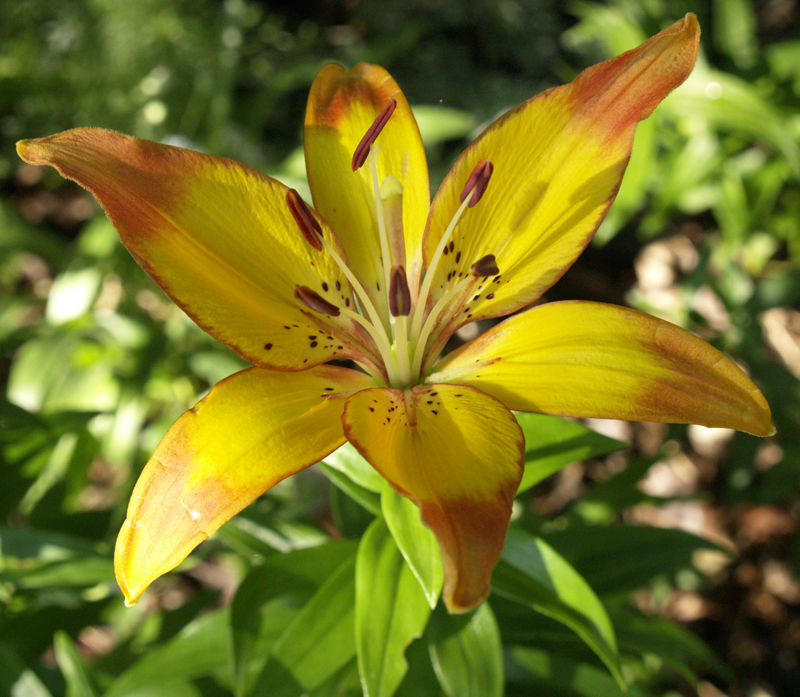May 19, 2011
Bright ideas for shade and vines
Yahoosers! When I bought my Linda lilies (Lilium asiatic ‘Linda’) a few years ago, I figured I was paying the price for vanity. But three out of the six have made it to their third year.

I think the other three just didn’t have the perfect spot, though they all get morning sun and afternoon shade. That’s the tricky thing, even from one side of a bed to the other, since light and moisture retention can vary so much.
I’m paying especial attention to light these days. Since I’ve had some trees pruned up, I’m getting hot spots of sun in areas that once had more shade. I’ll save that one for another time.
But since one of the top questions to CTG is working with shade, this week Tom meets with Mae Sanchez from Barton Springs Nursery for some bright ideas!

I’ve had my eye on that Lemon yellow rosemallow (Hibiscus calyphyllus) for a couple of years. But I plan to move it this weekend to a shadier spot where it gets morning sun or dappled sun.

With the tree pruned up, it’s getting a late hot blast that’s making it snarky.
Another that Mae features is Variegated Japanese sedge (Carex morrowii ‘Aurea-variegata’).

I planted one in spring 2010, and loved it so much that last fall I rounded up three more. They took a bit of damage in the cold, but not much. They’re Monrovia plants, so a luxury, but after two years of drooling over them, I succumbed. They’re perfect in my island bed that gets morning sun, afternoon shade and a tilt of filtered late sun.
Here’s Mae’s list for the day, including that compact mock orange in the CTG picture. Yummy. It’s on my list.
While I was FINALLY at a nursery, I couldn’t resist this trailing white-veined Dutchman’s pipe (Aristolochia fimbriata) for one of my semi-shade areas. I’ve admired it for years under trees as a groundcover to attract pipevine swallowtail butterflies.

I’m hoping it’s the perfect summer cover under the Angelica pachycarpa that’s on its way out after months of cool weather texture under our tree. When the Dutchman’s pipe goes dormant in winter, Angelica will fill the space.

Daphne’s Plant of the Week is Siberian iris (Iris siberica ‘Ruffled Velvet’), a good one for shade and wet areas for mid-April flowers. They’re also narrow, which works perfectly for Daphne in a sliver bed at the porch that stays moist.

Most likely, you’ll have to get these online, but I’m thinking they’re the perfect solution for my shady nook in front where the AC drains, just to have the grassy foliage when they’re not blooming.
Daphne also answers one of our top questions: how to water?

With my schedule, I’m just now getting around to planting new things. On one hand, it’s the worst time to plant perennials, trees, and shrubs. On the other hand, now is the time to plant summer blooming annuals (in a few weeks, Daphne explains what happens to summer annuals that are planted too early!)
Anyway, since I’m planting both, this means a little extra attention to their care. As I’ve mentioned before, sometimes I’ll make a little “umbrella” for plants for a week to reduce the heat stress while they settle in. This is a good trick if you have to move plants for a summertime house project, like heaven help us, a plumbing pipe that needs to be dug up! And: yesterday a gardener dug up a plant for me. Then, she cut a bough from an ashe juniper to shade it. Now that’s a GREAT idea!
Another top CTG question is “what vines can I grow?” Most of us have a spot we want to screen. Or we want to add vertical attention in a narrow spot. Merrideth Jiles from The Great Outdoors goes to new heights with:
* Annuals (cypress vine, purple hyacinth bean, morning glory)
* Deciduous perennials that die to the roots in winter (passionvine, coral vine, Giant Dutchman’s pipe)
* Deciduous perennials that keep their structure in winter (wisteria, Virginia creeper, trumpet vine)
* Evergreens (star jasmine, cross vine, fig ivy, coral honeysuckle)
Many of these also attract hummingbirds, bees, butterflies, and other pollinators, another good reason to add vines!
The Giant Dutchman’s Pipe (Aristolochia gigantea) is a whopping eyeful compared to my diminutive trailing one!

I first met this one when we taped Laura Joseph’s “secret treasures” garden. This is drama queen at its best.
But here’s the drama queen for shade: lush variegated Virginia creeper. You can also use this winter-deciduous vine as a groundcover.

Here’s Merrideth’s complete vine list.
Finally, I dedicate this blog to Judy Tye, who passed away suddenly on May 16. Judy was a Waco fan who championed me from my first enewsletter in 2000. She was a passionate gardener who became a dear friend over the years, always encouraging me, and sending me great ideas for CTG, and sharing her garden knowledge with me. I will miss her so very much.
Until next week, Linda

